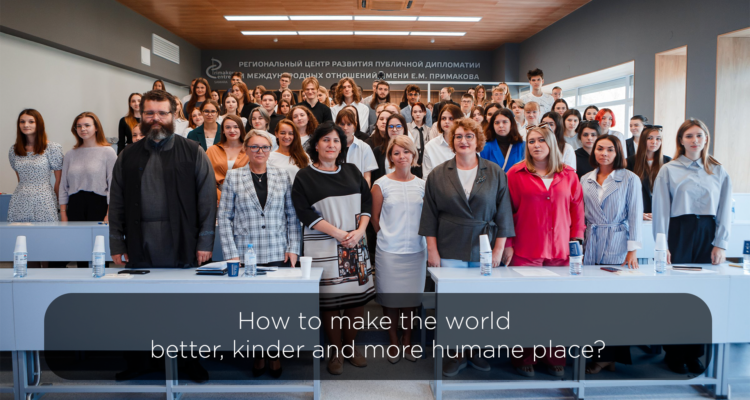On 5 September, the International Day of Charity, a all-Russian launch of the “Service Learning” educational programme took place at Samara University.
Samara University was among the hundred national universities that this year are introducing a new federal programme “Service Learning” into the educational process. It combines the study of academic disciplines with the formation of skills for socially useful work. The project combines theoretical training and practical socially significant activities into a single educational process, allowing each student to gain professional experience in implementing community projects.
“The university today is a point of concentration of all existing opportunities of the youth policy ecosystem. Any educational activity somehow should be associated with practical tasks. The implementation of the module “Service Learning” will allow universities to be involved in the life of cities and local communities, in the joint solution of urgent problems facing society today,” said Olga Petrova, Deputy Minister of Science and Higher Education of Russia.
“This is a good initiative, because it allows to involve young people in volunteer activities and to put this work on new, qualitative level,” said Mikhail Leonov, vice-rector for educational work and youth policy. – The course “Service Learning” will be launched in the direction of training “Social Work”, because it is in this direction that people who initially chose the path of service to society came to study. In time we will scale the course to other areas of training. It is important that students will work with specific non-profit organisations. Non-profit organisations will act as social partners of the university and form a package of tasks, both global and local. For example, protecting the elderly from telephone swindle, helping people without the fixed place of residence. Young people, being still students, will solve a global task – to make our world better, kinder, more humane”.
The first students of the course will be first-year students of “Social Work” and “State and Municipal Management”. They will study the theory and practice of social design.
The concept of this federal programme is that we are not just volunteers, we are executors of a social order,” says Svetlana Egorova, Dean of the Sociology Faculty. – We start from the first year, so that students are immersed in this process the whole time they are studying. In the first semester, this module will manifest itself in coursework. The full programme will be launched from the second semester. Students will first be given with the general basics of what social projects are, what are the mechanisms for their implementation, and then – into the “field”! I emphasise that this is not volunteering. This is a professional activity, based on the basic competences that our students possess. They can conduct sociological research, or they can act as coordinators, for example, in a project to create hearing aids.
In the course of the educational course presentation, students got acquainted with non-profit organisations and charitable foundations that claim to be social partners of Samara University and are ready to place social orders on the DOBRO.RF platform. Among such partners are the Resource Centre for Support and Development of Samara Region Volunteerism (Volunteering), the Interregional Youth Public Organisation “Inclusive Resource Centre”, the Charity Foundation “You are at Home”, the youth public movement to help homeless animals “LAPA”, the Samara Regional Public Organisation “Fresh Wind”, the Samara Regional Branch of the All-Russian Public Movement “Volunteers of Victory”.
Archpriest Maxim Kokarev, Rector of the Samara Orthodox Theological Seminary and a graduate of Samara University, immediately named three projects that need the support of young people: the “Abode of Mercy” in the village of Zubchaninovka, the crisis centre “Home for Mothers” and the Centre for Children with Cerebral Palsy.
Social customers can be NPOs and foundations, state and municipal authorities, public sector institutions (schools, libraries, social centres, medical institutions, etc.), social entrepreneurs, businesses implementing corporate social responsibility and sustainable development programmes.
The DOBRO.RF website has posted professional requests for project tasks from non-profit and commercial organisations, budgetary institutions and authorities, social entrepreneurs and socially responsible businesses. The first wave of applications will last until 15 September.
Lyudmila Kurilenko, Head of the Department of Theory and Technology of Social Work, summarised: “What does it mean to train by service? How will service help to expand the professional competences and interests of future social service specialists? – Today we have tried to answer these questions”.
Source: Samara University.









